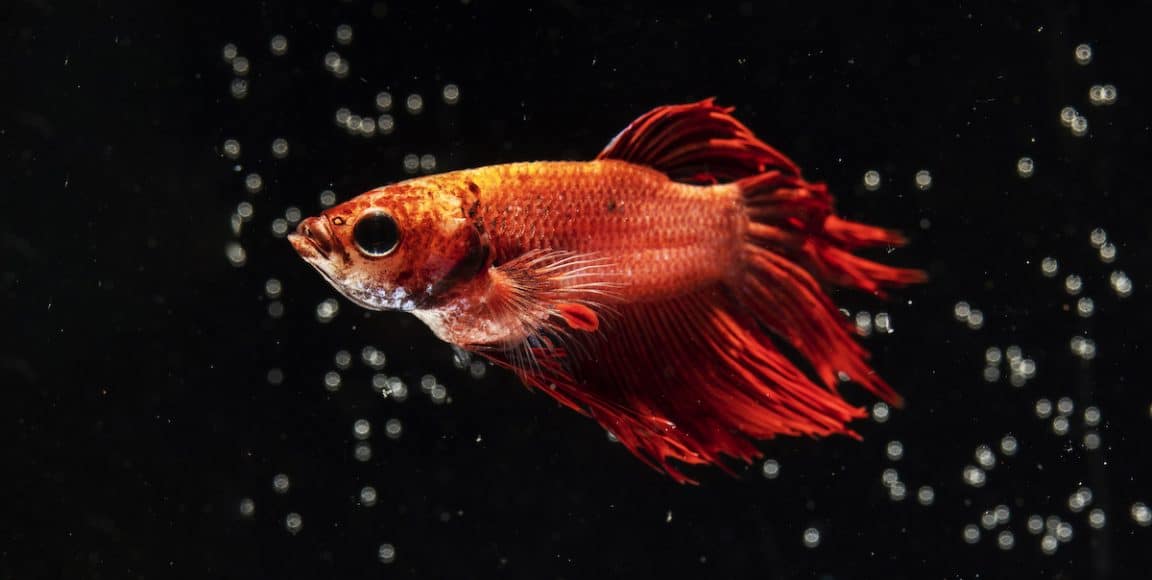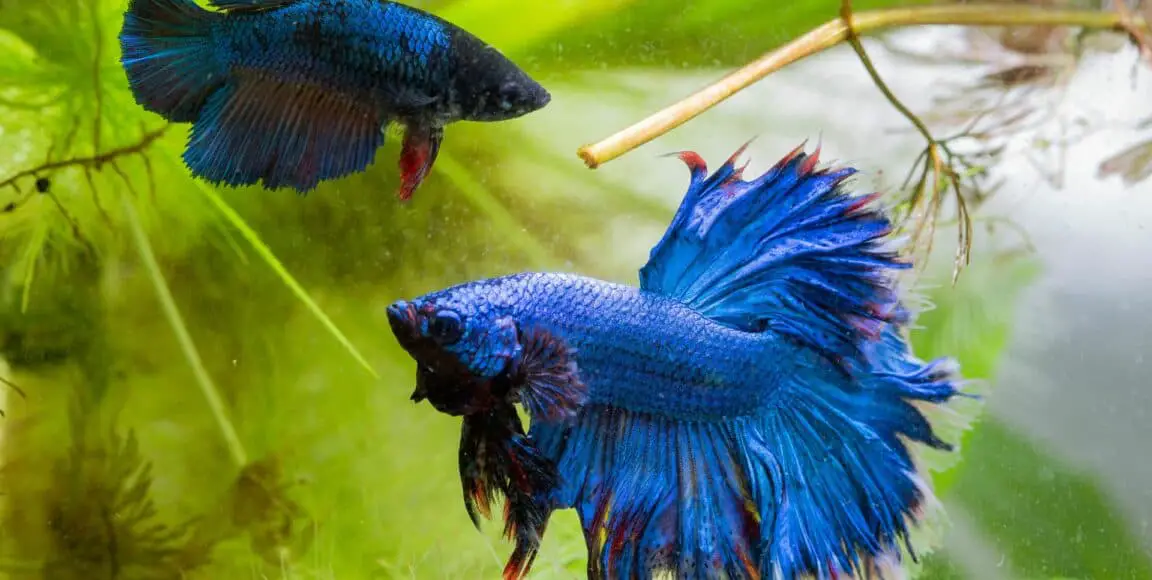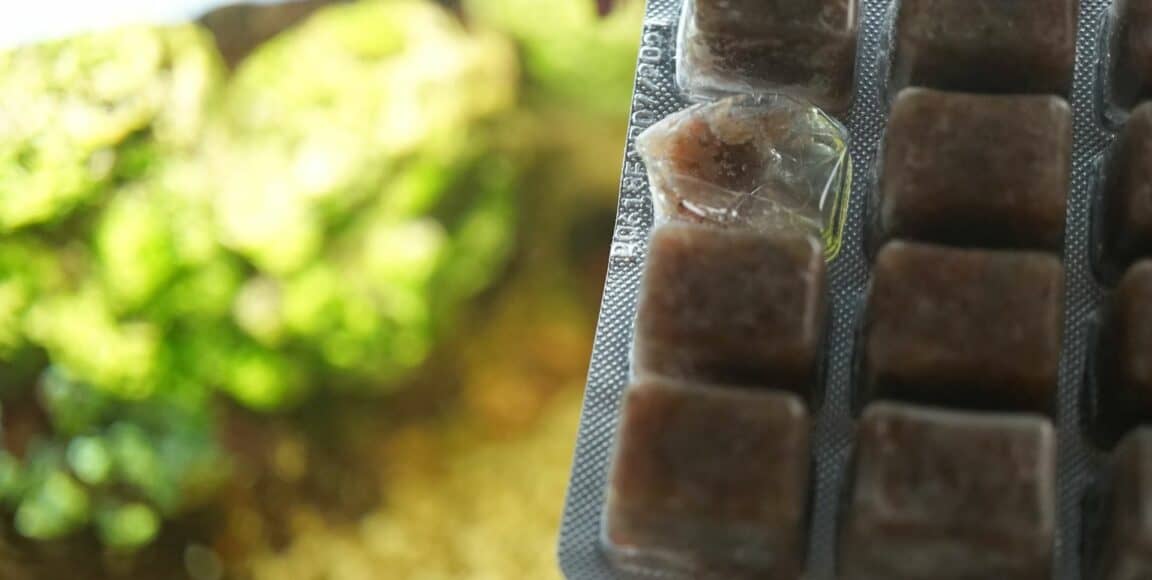Last Updated on February 17, 2023
Is your beloved betta fish not eating as much as usual?
As a betta owner, it’s natural to worry about your aquatic friend’s health and wellbeing.
Betta fish are a joy to have, but when they stop eating or lose their appetite, it can be a cause for concern.
So whether you’re a new fish enthusiast or experienced, you can surely gain something from this article.
We’ll explore common reasons your betta fish may not be eating and provide practical solutions you can follow.
So if you’re ready to provide the best possible life to your betta fish, keep reading!
Table of Contents
Key takeaways
- Bettas can survive up to 14 days without food, but this is strongly frowned upon.
- Besides overfeeding and food boredom, some usual reasons your betta fish won’t eat are poor food quality, bad water conditions, environmental change, and sickness.
- Fasting your betta fish for 24 hours is advisable as it can help avoid constipation and swim bladder disease.
How long can your betta survive without food?

Before diving into why your betta fish may not be eating, let’s first identify how long they can live without food.
I hope you’re sitting down for this next bit of information because I got really surprised when I heard it.
Here it is: Your betta fish can survive more than a week without meals! It can go for as long as 14 days, but only if your betta’s tank is well-maintained.
But while it’s true that bettas can go without food for about 10 to 14 days, we highly discourage starving them this long.
Doing so is considered animal cruelty and can be detrimental to your pet’s health.
But how can bettas survive this long without food? The answer lies in their unique biology.
Betta fish can rely on its fat storage on the 5th to 7th day of no food. This process, however, can weaken their immune system, making them more prone to illnesses and diseases.
That being said, there are instances when fasting can be beneficial for your betta fish.
For example, if your pet fish is experiencing swim bladder or stomach issues, a day or two of fasting can help solve these problems.
However, like I’ve mentioned, prolonged fasting can cause more harm than good.
As a betta owners, it’s your responsibility to be mindful of the eating habits of your aquarium fish.
If you notice your betta fish stops eating, it’s best to act immediately and address the issue.
9 Reasons why your betta fish is not eating
There could be several reasons for this behavior. But the good news is that there are also practical solutions to each problem.
Let’s explore each one and what we can do to help regain their appetite:
1. Your betta is not hungry
You may notice uneaten food floating around the aquarium and assume your fish is not eating.
One common reason for this is that they aren’t that hungry.
Bettas have receptors in their brain that signals their body when they are full.
However, overfeeding can still occur, which is why we don’t advise giving too much food to your betta fish.
Remember that a betta’s stomach is just about the size of their eyes. So, expecting them to eat more than that won’t work and cause huge problems.
Solution:
A simple solution to this problem is to ensure you are not feeding your betta too much food.
You may start feeding your betta no more than 1-2 pellets twice daily.
If you notice that your female or male betta fish devour this and seem to be looking for more food, then you can increase the amount of their food by one pellet.
In addition, you can put them on 1-day weekly fasting to avoid constipation.
This is a healthy practice, but make sure not to go over 24 hours.
2. Your betta is a picky eater
Even a healthy betta could be a picky eater, just like some of us.
Consistently feeding your betta fish with one type of food and then suddenly changing it could explain why they are being picky.
To confirm this, try feeding them with his go-to food.
If he eats it without any problem, then it is most likely that your pet is just being fussy.
Solution:
To solve this problem, the first thing you can do is, again, to feed your betta fish with the same food you used to feed him.
If this doesn’t work, you can change your pet’s diet with different varieties of food until he stops being picky.
Introducing them to new foods will help them to adjust to their diets.
One more option you can do, and probably the least advisable, is to starve your betta for a few hours or days.
By the time you feed him the food he doesn’t like, he will have to adjust and eat what you have to offer.
3. You have a new betta

They see other fish as competition. Betta fish, in their natural habitat, live most of their life by themselves.
So, introducing a new betta fish in the tank may stress out your fish which is why they might refuse to eat their food.
Although female bettas can survive in a group, male bettas are built differently.
However, the stress is not only felt by your old fish but also by your new one.
The move from another place to a new home will also cause them stress especially if you had your betta shipped instead of getting him from a shop.
Solution:
In this case, you can only give your betta time to settle into its new habitat.
Try keeping the lights off for a while and schedule their feeding time in the morning and evening.
If your betta doesn’t want to eat, remove leftover food after 10 minutes to avoid polluting their water tank.
4. Your betta fish is not familiar with the food
Sometimes your fish is not eating because they don’t recognize that what you’re feeding them is food.
This is quite common when you feed them pellets and flakes.
In the wild and with most breeders, bettas usually eat a mixture of live, frozen, and freeze-dried foods.
Due to this diet, pellets and flakes will most likely be new to them when first introduced.
Solution:
The best solution in this situation is to keep exposing and introducing them to these kinds of food until they realize it’s edible.
Even though bettas can survive without eating for a few days, it’s really important not to make a habit of starving them.
Make sure you have a backup food prepared just in case they still won’t be eating pellets or flakes.
5. Feeding them frozen food or freeze-dried incorrectly

Giving your bettas freeze-dried and frozen foods is good for their diet, but they may ignore this if not thawed properly.
Aside from this, frozen food can expand when dropped in the tank as it absorbs water again.
If your pet eats the fish food too fast, it may continue expanding and result in constipation and swim bladder disease in some cases.
But before choosing what to buy between the two, here are some of their primary differences:
- Water Content: Freeze-dried food is dehydrated and has almost no water content, while frozen food contains more water.
- Preparation: Freeze-dried food is typically easier to prepare because it can be added directly to the tank. Frozen ones need to be thawed first and can be messy to handle.
- Shelf Life: Freeze-dried food can last much longer than frozen food and doesn’t require refrigeration or freezing. On the other hand, frozen meals need to be kept in the freezer and have a shorter shelf life.
Solution:
For these types of betta food, the solution is very easy.
Defrost them first before putting the food in the tank.
Once thawed properly, your betta should start eating its food heartily.
6. Poor quality food
If your betta is not eating, one factor you might want to consider is the quality of the food you are giving them.
Although buying cheap food from stores may seem the most convenient for us, keep in mind that its low price is because it is made from cheap ingredients.
But what if I’m already feeding them quality food, yet they still won’t eat it?
This is where the varieties of food and giving them a balanced diet comes into place.
Aside from foods you can buy in pet stores, you also need to mix their diets with live, frozen, and freeze-dried foods.
Solution:
The best solution in this situation is to provide your betta fish with a balanced diet.
Again, these diets may consist of pellets mixed with either live, frozen, or freeze-dried food.
Some of the best recommendations out there include (but not limited to) brine shrimp, mosquito larvae, bloodworms, and freeze-dried daphnias.
To check out other best fish food options for your betta, check out this article.
7. There is a change in the environment
Poor water quality can very much affect your betta fish.
Changes in water quality or parameters such as the pH level can affect your betta’s health and eating habits.
Ammonia is said to be the most common cause of change in water parameters, resulting in your fish not eating.
However, not all changes are caused by harmful chemicals; Sometimes, as simple as changing the tank, water will have your betta fish getting used to the new environment.
Solution:
In this situation, you can try to feed your betta fish a few hours after changing the water to give them more time to adjust.
Also, always check the water parameters and make necessary adjustments to avoid causing further harm to your beloved pet.
Your betta’s appetite should return to normal once you’ve ensured that they live in a safe and clean environment.
8. Your betta is sick
We always tend to lose our appetite when we’re not feeling well.
In betta’s cases, ruling out illnesses or diseases is one of the first things you do when you notice their lack of appetite.
When this does happen, immediately lookout for other symptoms such as having a lack of energy, sudden change in behavior, and skin discoloration, which could indicate the seriousness of your fish’s health.
What are some common diseases that can affect your betta?
A lack of appetite can be due to constipation, swim bladder disease, and dropsy.
Solution:
You must act fast if you’re certain you have a sick betta fish.
If you suspect that your betta could be ill, you have to act accordingly and swiftly.
Not addressing this immediately will only worsen their condition, which could even lead to death when not treated.
Research how to treat your betta based on the symptoms showing or better if you can contact the nearest vet in the area if your betta’s condition is more serious.
9. Water temperature needs adjustment
Like the other tropical fish, bettas (considered freshwater fish) are best kept in a warm temperature ranging from 75 to 80 degrees Fahrenheit.
When you notice that your betta is not eating, this may be due to the tank’s temperature.
If your aquarium’s temperature is not warm enough for your cold-blooded friend, it may result in lethargy and a slower metabolism, making it harder and longer to digest food.
Solution:
Make sure that you have a water heater inside your tank which is heated as closely as the recommended temperature.
What if I live in a warm or hot country?
The answer is you still have to provide a heater because the water temperature changes differently (and is colder) than the land temperature.
Betta fish won’t eat? What to feed them
Now that you know the reasons behind your betta’s lack of appetite and how to solve it, let’s talk about the common questions about betta feeding.
How much to feed a betta fish?
Again, this depends on how much your betta eats and the type of food you are feeding them.
Ideally, it is best to keep in mind to give them only a portion size that is equal to 5% of their body size.
Since bettas thrive in a clean environment, remove any excess food in the tank to keep it as clean as possible.
How often should I feed my betta?
Your betta may eat twice a day, one in the morning and another at night.
There are fish keepers giving a full portion meal once a day while others prefer giving half a portion twice daily.
Whichever suits your schedule best, it would be best to consistently feed your bettas at a certain time so your pet will know when to expect their feeding time.
Note: If you are training your betta some tricks or want to engage with them, giving them a little treat will be fine.
What should I feed my betta fish?
If your betta fish don’t eat, try to feed them freeze-dried or frozen bloodworms. Brine shrimp, mosquito larvae, and fruit flies are also excellent food choices.
Betta pellets are specially made for them and are packed with the right amount of protein to keep your betta healthy.
Try not to give them too much fish flakes as they lack the nutrients your betta needs. Fish flakes should be your last option.
Why isn’t my betta fish eating his pellets?
Poor water quality, low-quality ingredients, overfeeding, food boredom, and illness can all contribute to a loss of appetite.
So if you’ve been trying to feed your betta fish pellets to no avail, try to switch things up or buy a premium one.
How to get my betta fish to eat?
If your betta fish is not eating, there are several things you can do to encourage it to eat:
- Improve water quality: Poor water quality can be a great contributor to why your betta fish stop eating.Make sure to clean your tank regularly and keep the water at the right temperature and pH level.
- Change the food: Try switching to a different brand or type of pellet to see if your betta is more interested in it.
- Try frozen or live food: Betta fish enjoy brine shrimp, bloodworms, and daphnia. Feeding them these kinds of food will avoid poor diet.
- Create a feeding routine: Bettas thrive on routine. Try feeding your betta at the same time every day in the same spot to create a routine that it can follow.
- Adjust water temperature: Use a heater to adjust the water temperature if necessary, and monitor it regularly to ensure that it remains stable.
If none of these solutions work, it may be time to consult an expert or veterinarian to ensure no underlying health issues.
Betta fish not eating: Final thoughts
Now that you better understand your betta’s behavior and eating pattern, it is time to take the necessary actions.
Do further research and remember not to panic so you can give the best assistance needed by your betta fish.
Try observing your betta first and see if he is indeed not eating. Check the quality of your food and keep in mind the diet your pet needs.
If your betta is not eating due to stress, give it time first and remember that some issue resolves itself over time.
